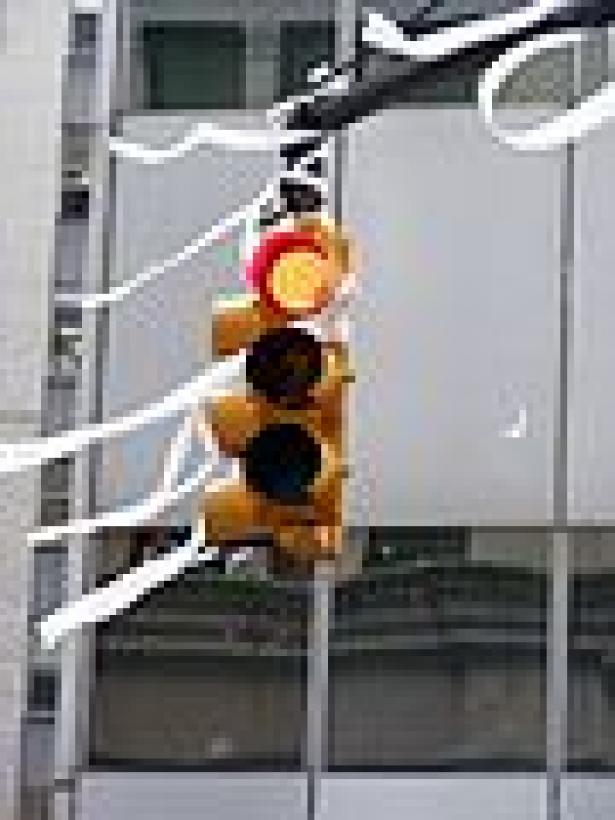Thousands of Illinois Drivers Would Get Their Licenses Back Under a Criminal Justice Reform Bill
ProPublica is a nonprofit newsroom that investigates abuses of power. Sign up to receive our biggest stories as soon as they’re published.
Illinois lawmakers voted to end the practice of suspending driver’s licenses for unpaid red-light and speed camera tickets, part of a broader criminal justice reform package passed this week.
If signed by Gov. J.B. Pritzker, the legislation would restore the driving privileges of some 11,000 people by July and eliminate a significant trigger for personal bankruptcies in Chicago.
ProPublica reported in 2018 on how Black motorists on Chicago’s West and South sides are disproportionately harmed by license suspensions over unpaid tickets, part of a series on how the city’s ticketing and debt collection systems have burdened the poor and led to tens of thousands of bankruptcies.
Because so many people with suspended licenses drive anyway, they risk getting arrested and swept into the criminal justice system.
The vote in the General Assembly was the latest reform prompted in part by the reporting, which was later done in collaboration with WBEZ, and came nearly a year after Pritzker signed legislation that ended license suspensions over unpaid parking tickets. At the time, the governor said he’d consider legislation to end suspensions over unpaid camera tickets.
Under the legislation, cities would no longer be able to seek license suspensions for motorists who have five or more unpaid red-light or speed camera tickets. The legislation also ends the practice of preventing drivers with outstanding traffic fines from renewing their licenses. A spokesman for the secretary of state said there are about 500,000 holds on licenses over traffic debt, although one person can have multiple holds. State officials could not immediately say how many individual drivers have lost their licenses.
Mari Castaldi, director of policy and advocacy for the nonprofit Chicago Jobs Council, which has helped lead the push for an end to license suspensions tied to ticket debt, said the measure would “stop the debt spiral and increase employment opportunities” for thousands of motorists whose inability to drive limits their job prospects.
“This is really a time of unprecedented economic and unemployment and public health crises in our state,” she added. “This kind of relief could not come at a better time.”
In a statement, a Chicago Finance Department spokesperson said the legislation dovetails with efforts by Mayor Lori Lightfoot to reduce the city’s reliance on fines and fees to generate revenue. “The Mayor commends state lawmakers who have chosen to end the unproductive and unfair practice of suspending driver’s licenses simply due to one's inability to pay a ticket,” the statement said.
While ticket debt reform advocates won a victory in Springfield this week, they lost in the U.S. Supreme Court. On Thursday, the court ruled 8-0 that the city was not violating bankruptcy law by holding onto impounded vehicles after their owners file for Chapter 13 bankruptcy.
For years, thousands of motorists turned to bankruptcy and a protection known as the “automatic stay” to retrieve impounded vehicles, lift license suspensions and hold onto their ability to drive. Filing for bankruptcy was, at the time, often cheaper than getting on a city ticket payment plan. (The city has since made its payment plans more accessible to low-income motorists.)
In 2017, city officials stopped immediately returning impounded vehicles until motorists agreed to make paying off ticket debt a priority in their bankruptcy payment plans. The city argued it was doing so to protect motorists from bankruptcies that were doomed to fail and to deter filings from those who had no intention of paying their debts.
But the process often took months and left many people unable to get to work. Motorists and their lawyers appealed, claiming the city’s strategy violated basic bankruptcy rights. Both the U.S. Bankruptcy Court of the Northern District of Illinois and the 7th U.S. Circuit Court of Appeals ruled against the city, which appealed to the Supreme Court.
The statement praised the ruling, saying it “ensures that there will be fewer unnecessary Chapter 13 bankruptcies, particularly fraudulent filings, by confirming that that all creditors’ interests are protected when a debtor files bankruptcy.”
But in a concurring opinion that cites reporting from ProPublica and WBEZ, Justice Sonia Sotomayor wrote that “regardless of whether the City’s policy of refusing to return impounded vehicles satisfies the letter of the Code, it hardly comports with its spirit” of granting a fresh start to debtors. “Without their vehicles,” she wrote, “many debtors quickly find themselves unable to make their Chapter 13 payments. The cycle thus continues, disproportionately burdening communities of color.”
Melissa Sanchez is a reporter at ProPublica Illinois who is focused on immigrants and low-wage workers. Her work here examining Chicago’s punitive ticketing and debt collection system helped prompt major city reforms, including the end of driver’s license suspensions for unpaid parking tickets and debt relief.
She previously reported on topics ranging from education to absentee ballot fraud for The Chicago Reporter, Catalyst Chicago, el Nuevo Herald in Miami and the Yakima (Washington) Herald-Republic. She lives in a 1926 brick bungalow on Chicago’s Northwest Side with her husband, their toddler son, and two cats. Habla español.
Support fearless journalism
ProPublica relies on reader support, and your donation will help our well-researched, investigative journalism shine a light on corruption and hold those in power accountable.
Join tens of thousands of ProPublicans by making a gift of any amount today. Thank you!


Spread the word